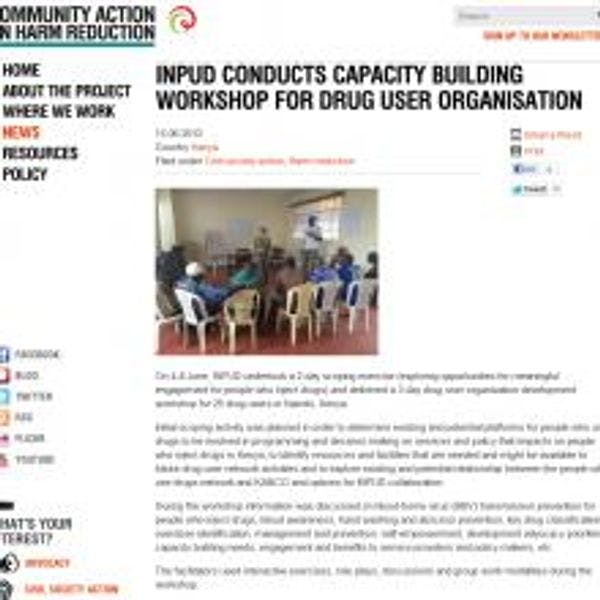Presentación oficial de la Red keniata de personas que usan drogas
La red se ha establecido para fomentar el crecimiento y el respaldo de de organizaciones de usuarios de drogas en Kenya con el fin de crear una plataforma representativa que pueda incidir en las políticas y los programas que afectan a dichos usuarios.
Más información, en inglés, está disponible abajo.
Suscríbase a las Alertas mensuales del IDPC para recibir información sobre cuestiones relacionadas con políticas sobre drogas.
The Kenya Network of People who Use Drugs (KeNPUD) was founded in June 2012. The network was established on the initiative of a core group of people who use drugs in Nairobi who intend to stimulate the growth and support the development of drug user organisations in other parts of Kenya in order to create a representative platform for input into policy and programming that impact on people who use drugs. This activity began following technical assistance from INPUD enabled by the International HIV/AIDS Alliance’s 'Community Action on Harm Reduction' (CAHR) programme and with support from the CAHR linking organisation, the Kenya AIDS NGOs Consortium (KANCO).
KENPUD is now gearing up to play a role in Kenyan drug policy. In spite of having no financial support the network is conducting regular meetings and has already established a clear governance system and core objectives. The KeNPUD mission statement states that its aim is to raise the voice of people who use drugs "to ensure our human rights are upheld in all relevant policy and laws. We will advocate for a full range of harm reduction, HIV related and other health services and work to eliminate stigma and discrimination against people who use drugs". KeNPUD is currently registering as a Community Services Organisation and will receive ongoing technical support from INPUD.
For more information please contact Tinga Kalafa at tingakalafa@yahoo.com and info@inpud.net.
Please also visit the website of the CAHR Project.
